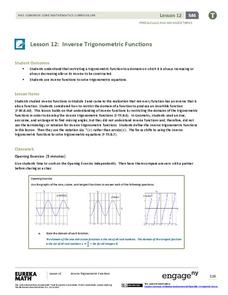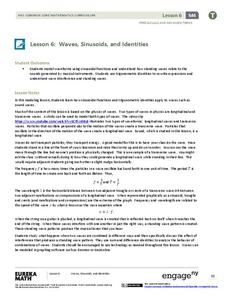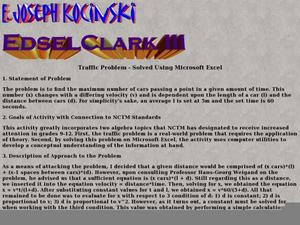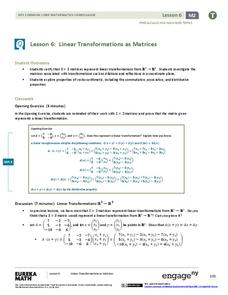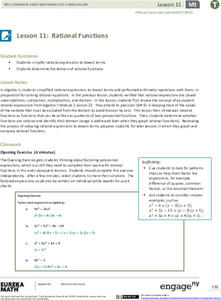EngageNY
Inverse Trigonometric Functions
Build on the understanding of finding angles using trigonometric ratios. Pupils develop the definitions of inverse trigonometric functions by restricting their domains in the 13th lesson of a 16-part series. They use inverse functional...
EngageNY
Waves, Sinusoids, and Identities
What is the net effect when two waves interfere with each other? The lesson plan answers this question by helping the class visualize waves through graphing. Pupils graph individual waves and determine the effect of the interference...
EngageNY
Complex Numbers and Transformations
Your learners combine their knowledge of real and imaginary numbers and matrices in an activity containing thirty lessons, two assessments (mid-module and end module), and their corresponding rubrics. Centered on complex numbers and...
Curated OER
The Football and Braking Distance: Model Data with Quadratic Functions
Students engage in a lesson plan that is about the concept of data analysis with the use of quadratics. They use a Precalculus text in order to give guidance for independent practice and to serve as a source for the teacher to use. The...
EngageNY
Solutions to Polynomial Equations
Take a step back to Algebra II. The first lesson in a series of 23 asks scholars to remember working with quadratic equations with complex solutions. Pupils apply polynomial identities to complex numbers and work examples that show how...
Curated OER
Traffic Problem- Solved Using Microsoft Excel
Students relate algebra to real life scenario. In this algebra lesson, students design a plan to help traffic flow smoothly using velocity and speed. This assignment is done using Microsoft Excel.
EngageNY
Coordinates of Points in Space
Combine vectors and matrices to describe transformations in space. Class members create visual representations of the addition of ordered pairs to discover the resulting parallelogram. They also examine the graphical representation of...
EngageNY
Linear Transformations as Matrices
Don't stop with two-dimensional learning, go to the next dimension! Learners verify that 3x3 matrices represent linear transformations in the third dimension. Additionally, they verify the algebraic properties that extend to vector...
EngageNY
Designing Your Own Game
Your classes become video game designers for a day! They utilize their matrices, vectors, and transformation skills to create and design their own game images. The complex task requires learners to apply multiple concepts to create their...
EngageNY
Directed Line Segments and Vectors
Investigate the components of vectors and vector addition through geometric representations. Pupils learn the parallelogram rule for adding vectors and demonstrate their understanding graphically. They utilize the correct notation and...
EngageNY
Vectors and the Equation of a Line
Represent linear equations in both two and three dimensions using parametric equations. Learners write parametric equations for linear equations in both two and three variables. They graph and convert the parametric equations to...
EngageNY
Vectors in the Coordinate Plane
Examine the meaning and purpose of vectors. Use the activity to teach your classes how find the magnitude of a vector and what it represents graphically. Your pupils will also combine vectors to find a resultant vector and interpret its...
EngageNY
Solving General Systems of Linear Equations
Examine the usefulness of matrices when solving linear systems of higher dimensions. The lesson asks learners to write and solve systems of linear equations in four and five variables. Using matrices, pupils solve the systems and apply...
EngageNY
Estimating Probability Distributions Empirically 2
Develop probability distributions from simulations. Young mathematicians use simulations to collect data. They use the data to draw graphs of probability distributions for the random variable in question.
EngageNY
Inverses of Logarithmic and Exponential Functions
Revisit the relationship between logarithms and exponentials. Learners review the notion of logarithms as the way to solve exponential equations in the 21st segment in a Pre-calculus series of 23. Pupils use the knowledge to prove that...
EngageNY
Does Every Complex Number Have a Square Root?
Help the class find a better way. Pupils recall finding nth roots or a complex number in polar form from a previous module to find the square root of a complex number. Using the second installment in a series of 23, scholars discover it...
EngageNY
The Binomial Theorem
Investigate patterns in the binomial theorem. Pupils begin by reviewing the coefficients from Pascal's triangle. They look at the individual terms, the sums of the coefficients on a row, and the alternating sum of each row. Individuals...
EngageNY
Curves in the Complex Plane
Go around and around on the complex plane. The sixth lesson in a 23-part unit reviews representing numbers in the complex plane. Pupils graph numbers with equal moduli and notice they represent a circle. They continue to explore complex...
EngageNY
Curves from Geometry
Escape to investigate hyperbolas. Pupils take a look at what happens to the elliptical orbital path of a satellite that exceeds escape velocity as the opener to the eighth lesson in a unit of 23. Scholars analyze basic hyperbolas and how...
EngageNY
Volume and Cavalieri’s Principle
Take a slice out of life. The ninth section in a series of 23 introduces classmates to Cavalieri's principle using cross sections of a cone and stacks of coins. Class members participate in a discussion using pyramids and how Cavalieri's...
EngageNY
Transforming Rational Functions
Move all rational functions—well, maybe. Learners investigate the graphs of the reciprocals of power functions to determine a pattern between the graph and the power. Pupils graph rational functions where transformations are clearly...
EngageNY
Mid-Module 3 Assessment Task
Time to take a pulse check. The mid-module assessment allows pupils to check where their knowledge falls for the first portion of the module. The 10th resource in a series of 23 covers content from the binomial theorem to hyperbolas....
EngageNY
End Behavior of Rational Functions
Connect end behavior to previous learning. Pupils connect finding the end behavior of rational functions to finding end behavior of polynomial functions. The 13th segment in a 23-part unit starts with finding the end behavior or power...
EngageNY
Rational Functions
Make a connection between rational expressions and rational functions. Pupils review simplifying and performing operations on rational expressions and recall what it means for two rational expressions to be equivalent based on their...
Other popular searches
- Precalculus Logarithms
- Precalculus Complex Numbers
- Precalculus Logistic Growth
- Precalculus Projects
- Precalculus Polynomials
- Precalculus Syllabus
- Precalculus Lessons
- Precalculus and Creativity
- Kwl Precalculus
- Precalculus Review
- Precalculus Lesson Plan


